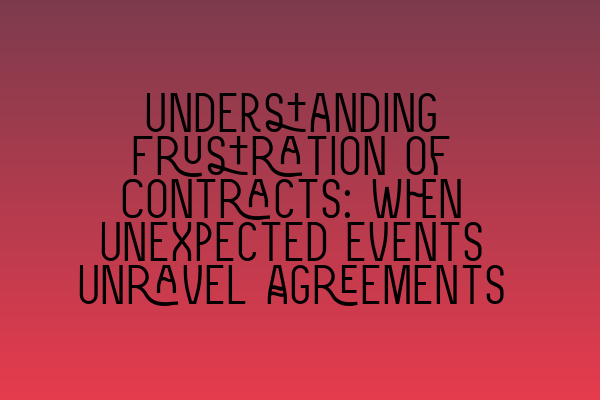Understanding Frustration of Contracts: When Unexpected Events Unravel Agreements
Contracts are the backbone of business transactions and legal agreements. They establish the rights and obligations of parties involved, ensuring a smooth and predictable flow of activities. However, sometimes unforeseen events can arise that make it impossible to fulfill the terms of a contract. In such situations, frustration of contracts comes into play to address the implications and potential consequences.
Frustration of contracts occurs when an unforeseen event, beyond the control of parties involved, renders the performance of a contract impossible, illegal, or radically different from what was initially anticipated. It is important to recognize that frustration is not simply a result of inconvenience or hardship; rather, it requires a fundamental change in circumstances that makes the contract impossible to fulfill.
Let’s take a closer look at the concept of frustration and how it affects contractual agreements.
Defining Frustration of Contracts
Frustration of contracts is a legal term recognized in contract law that allows parties to be released from the obligations of a contract when certain conditions are met. The concept of frustration exists to prevent parties from being unfairly held liable for circumstances they could not have reasonably foreseen or controlled.
To establish frustration, the event must be:
1. Unforeseen at the time of entering into the contract. This means that the event could not have been anticipated by either party, even with reasonable foresight.
2. Beyond the control of the parties involved. The event must be outside of the parties’ control, making it impossible to perform the contract in the manner originally intended.
3. Render the contract impossible to perform. The event must fundamentally alter the nature of the contract, making it impossible to fulfill the original terms.
It is important to note that frustration applies to both written and verbal contracts, and it can occur at any stage of the contractual relationship.
Examples of Frustration of Contracts
Frustration can arise in various scenarios, including:
1. Destruction or unavailability of subject matter: If the subject matter of the contract is destroyed or becomes unavailable, the contract may be frustrated. For instance, if a building intended to be rented is destroyed by a fire before the lease commencement, the contract may be frustrated as the subject matter is no longer available.
2. Personal incapacity or death: If the performance of a contract depends on an individual’s personal skills or expertise, and that person becomes incapacitated or dies, the contract may be frustrated.
3. Government intervention: If a change in government regulations or legislation makes it illegal to perform the contract, frustration may be invoked. For example, if a contract requires the export of certain goods, but the government imposes an embargo on those goods, rendering their export illegal, the contract may be frustrated.
4. Unexpected event impacting performance: Unexpected events such as natural disasters, strikes, or war that make it impossible or commercially impracticable to fulfill the contract can lead to frustration. However, mere financial difficulty or hardship is not considered sufficient for frustration to apply.
Effect of Frustration on Contractual Obligations
When frustration occurs, the contract is automatically discharged, and parties are released from their obligations. This means that neither party can be held liable for the non-performance of the contract. Furthermore, any obligations that were outstanding at the time of frustration will also come to an end.
It is important to note that frustration does not automatically entitle parties to recover any money or compensation already paid under the contract. The law aims to distribute losses fairly, and each case will be evaluated based on its specific circumstances. In some cases, the courts may order the party who has benefited from the contract prior to frustration to make restitution to the other party.
Additionally, it is crucial for parties to communicate and document the occurrence of frustration as soon as possible. Prompt and clear communication will help avoid disputes and ensure that both parties are aware of their rights and obligations.
Conclusion
Frustration of contracts is a legal concept that recognizes the impact of unforeseen events on contractual agreements. It provides a mechanism for parties to be released from their obligations when circumstances fundamentally change, making it impossible to perform the contract as originally intended. Understanding the concept of frustration is vital for anyone involved in contractual agreements, as it helps protect parties from unfair liabilities and ensures the smooth functioning of legal transactions.
If you found this article interesting, you might also want to read related articles such as:
– Barrister vs. Solicitor: A Comprehensive Comparison
– Exploring Different Solicitor Specializations: Finding Your Niche
– Embracing the Rise of Virtual Law Practices
– Unveiling Real-Life Case Studies: Insights into Legal Practice and Decision-Making
– Exploring Solicitor Salaries in the UK: Average Earnings and Factors Affecting Income
These articles delve into various aspects of the legal profession, providing valuable insights for aspiring solicitors and legal professionals.
